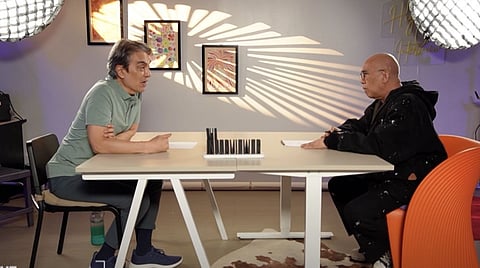
- NEWS
- the EDIT
- COMMENTARY
- BUSINESS
- LIFE
- SHOW
- ACTION
- GLOBAL GOALS
- SNAPS
- DYARYO TIRADA
- MORE

In a country long fatigued by political spin and soundbites, Congressman Toby Tiangco’s sit-down interview with Boy Abunda was a jarring but necessary jolt to the national consciousness.
The interview, which aired on Monday, began with a discussion about flood control projects — initially seen by many as the main controversy. But Tiangco quickly clarified that the real issue runs deeper: a mangled 2025 national budget, stripped of foreign-assisted project funding, rechanneled into unprogrammed allocations, and burdened with what he claims were unauthorized insertions totaling ₱13.8 billion — allegedly championed by Congressman Zaldy Co.
What Tiangco laid bare was a legislative process riddled with opacity, manipulated through backdoor channels like the now-defunct small committee — a four-member panel wielding disproportionate power over billions in public funds. According to him, the disbursement of funds not only bypassed constitutional priorities such as health and education but potentially violated commitments to international development partners.
Tiangco described his months-long investigation like a forensic accountant tracing line items, matching proponents with districts, and flagging mismatches. His findings? Billions allocated to districts with no connection to the listed proponents, including ₱6 billion split between Oriental and Occidental Mindoro, allegedly tied to Congressman Co.
Even more troubling were Tiangco’s allegations of substandard and ghost projects, linking contractors like Sunwest and citing testimony from officials such as Governor Humerlito Dolor of Oriental Mindoro and Baguio City Mayor Benjamin Magalong. He revealed that ₱80 billion worth of projects have since been “held” — a staggering figure with massive implications.
One of the most telling moments was Tiangco’s recounting of being silenced in the House of Representatives, where he was denied the opportunity to present his findings, even with hard data on a USB stick. In contrast, the Senate Blue Ribbon Committee welcomed his testimony — which he offered voluntarily, despite not taking an oath out of parliamentary courtesy. This contrast speaks volumes: while one chamber sought truth, the other appeared more focused on protecting its own.
A more personal moment came when Boy Abunda asked about Tiangco’s long-standing friendship with House Speaker Martin Romualdez — first cousin to First Lady Liza Araneta-Marcos and President Ferdinand “Bongbong” Marcos Jr.
“I had to choose between my friendship with Martin and the legacy of the President,” Tiangco said, drawing a sharp line between loyalty and integrity. He was careful not to generalize: “Maraming matitinong kongresista.” But he made no apologies for exposing the rot, challenging the notion that Congress must protect its own at all costs.
His claim that congressmen cannot be compelled to testify under oath — unless they volunteer — highlights a structural weakness in legislative oversight. If lawmakers are beyond the reach of truth-seeking mechanisms, then who polices those entrusted with the national purse?
Throughout the interview, Tiangco reiterated one crucial point: President Marcos Jr. initiated this investigation. The President publicly released the list of questionable insertions, showed visible disgust during his State of the Nation Address, and has backed the creation of an independent commission on infrastructure corruption. If the President follows through — even if it means going after relatives and allies — it could mark a turning point in the country’s battle against institutional corruption.
Yet despite Tiangco’s clarity and courage, the road ahead remains uncertain. Will anyone be jailed? Will powerful lawmakers face consequences? Or will this be another case of noise without justice? Tiangco believes change is possible: the abolition of the small committee, livestreamed bicameral proceedings, and the holding of ₱80 billion in suspect funds are signs of progress. He calls for digitization, transparency, and reform — but remains aware of the limits. “This is only what I can do,” he says. “I can only tell you the truth of what I know.”
This may be one of the most consequential political moments of the year. In a single hour, Tiangco pulled back the curtain on a deeply flawed system, named names, acknowledged complicity, and challenged his own institution to do better. This isn’t just about budget insertions or flood control — it’s about who we are as a republic.
The Filipino people deserve transparency. They deserve accountability. They deserve better from their leaders. And they deserve leaders who, when the time comes, will choose the truth — even if it costs them everything.
